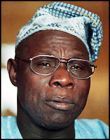Obasanjo called in to prevent collapse of Darfur peace talks
 ABUJA, Sep 7, 2004 (IRIN) — Nigerian President Olusegun Obasanjo intervened personally on Monday to prevent the collapse of peace talks aimed at ending the conflict in Sudan’s Darfur province as Khartoum and the two rebel movements stuck doggedly to conflicting positions.
ABUJA, Sep 7, 2004 (IRIN) — Nigerian President Olusegun Obasanjo intervened personally on Monday to prevent the collapse of peace talks aimed at ending the conflict in Sudan’s Darfur province as Khartoum and the two rebel movements stuck doggedly to conflicting positions.
Brigadier General Festus Okonkwo, the Nigerian commander of the African Union’s ceasefire monitoring force in Darfur, told reporters that Obasanjo was called in after “a hardening of positions” by the two sides had resulted in “deadlock.”
The African Union (AU), which is mediating the two-week-old Abuja peace talks, presented both sides with a draft protocol on security at the weekend.
However, officials said the Sudanese government delegation reacted by demanding the immediate disarmament of the two rebel groups in Darfur, the Sudanese Liberation Army (SLA)and the Justice and Equality Movement(JEM).
The rebels, in turn, rejected Khartoum’s demands and insisted that the pro-government Janjawid militia must first be disbanded and probed for crimes against humanity.
Ahmed Tugod, the spokesman for the rebel factions, said the rival parties met early on Monday with Obasanjo, who is the current chairman of the AU.
The Nigerian head of state urged both sides to make more concessions at the talks which resumed later in the afternoon, he added.
But Tugod said the rebels would remain uncompromising in their demands that government planes end their bombing of Darfur, where a ceasefire has supposedly been in place since April, and that the Janjawid be disbanded and investigated.
“The Sudan government is refusing to discuss Janjawid and discontinue aerial bombardment,” Tugod told IRIN. “For us these issues will decide the fate of the talks.”
The rebels also rejected proposals by the AU mediators that their forces be confined to designated cantonment sites as part of the ceasefire monitoring process. They said that would make them vulnerable to attacks by government forces.
Najib Abdulwahab, the spokesman of the Sudan government delegation at the peace talks, confirmed that the cantonment of rebel forces was a sticking point.
“The issue is very difficult for our brothers in the two movements,” Abdulwahab said. “But general and complete disarmament will not be achieved without that measure,” he added.
The Abuja peace talks, which began on 23 August, have so far made little progress in resolving the 18-month-old conflict in Darfur. According to the United Nations, an estimated 50,000 people have died in the conflict and about 1.4 million frightened villagers have been forced to flee their homes. Nearly 200,000 have fled as refugees to neighbouring Chad.
A draft protocol on humanitarian issues prepared by mediators last Thursday remained unsigned after the rebel factions demanded the immediate disbandment of the Janjawid militia as a pre-condition.
Signature of the protocol on humanitarian assistance would have helped international agencies to ramp up their efforts to deal with what the United Nations has described as the world’s worst humanitarian disaster.
Fighting erupted in Darfur in February 2003, when two rebels factions of mainly black African extraction, took up arms against the Arab-dominated Khartoum government complaining about decades of neglect and marginalisation.
The government of President Omar el Bashir has been widely accused of using the Janjawid, a militia force of Arab nomads mounted on horses and camels, to attack black African farmers and drive them from their villages.
The UN Security Council gave Khartoum an ultimatum on July 30 to address the humanitarian situation in Darfur and disarm the Janjawid within 30 days, threatening unspecified measures if it failed to comply.
But U.N. Secretary General Kofi Annan said in a report to the Security Council on 1 September the Sudan government had not done enough to provide security for Darfur people or check the activities of the Janjawid.
Jan Pronk, the UN special envoy to Sudan, proposed expanding the AU military force in Darfur from 300 to more than 3,000 men and giving it a mandate to protect civilians as well as to monitor ceasefire violations.
